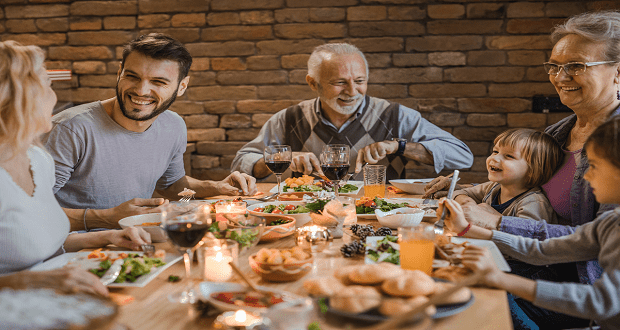
To my incredibly well-meaning parents,
I’m sorry for not cutting you any slack when we talk about current events. I’m sorry I expected you to be aware of all of today’s changing terminology. I’m sorry I scoffed at your genuine questions. And I’m sorry I overlooked the fact that you’re on a learning journey just like me and the rest of us, that we’re all in different places, and that it’s okay.
Growing up, there was an expectation that we always had dinner together as a family, but it never really felt like an obligation. Even when we weren’t permitted to use our phones or watch TV, sitting around the table with my parents and siblings—talking and laughing—never felt like a chore because our conversations were always exciting. No topic was off-limits; we would talk about international and domestic politics, religion, sports, pop culture, and so much more. My parents and I immigrated to the United States when I was young, so the lens through which they viewed the world was radically different than the one I was learning to use growing up here; this made for fascinating conversations. I learned a lot about the world from my parents, but what I only recently realized was that I was able to do so only because they created a safe space around the table where I could engage in conversations, trusting that I would be shown mercy when I (mis)spoke. The problem is that I didn’t extend the same courtesy to them.
I learned a lot about the world from my parents, but what I only recently realized was that I was able to do so only because they created a safe space around the table where I could engage in conversations, trusting that I would be shown mercy. Click To TweetWhen I left for college and started taking a variety of courses in the humanities, I started learning the theoretical framework and terminology that reinforced a lot of experiences and beliefs I couldn’t articulate up until that point. I also got involved in activist efforts and ideologies far more progressive and uncompromising than I had previously engaged in. So, the first time I went home for break and sat down for dinner, our usually fruitful conversations became explosive and unproductive. With the arrogance of an adolescent, I began walking into these conversations thinking I had all the answers— and that if they didn’t see things like I did, they were just part of the many systemic problems in the world.
The first time I went home for break and sat down for dinner, our usually fruitful conversations became explosive and unproductive. W/ the arrogance of an adolescent, I began walking into these conversations thinking I had all the answers Click To TweetOver the years, in order to continue to have any conversations, we deviated from the polarizing topics in favor of more light-hearted ones. I actually thought I would never be able to engage with my parents on the tough topics again, until I read We Can’t Talk About That at Work! How To Talk About Race, Religion, Politics, and Other Polarizing Topics. In reading it, I discovered not just a conversational tool, but also a sense of forgiveness in my heart that I had lost while arming my head with knowledge. It was then that I was able to re-center myself and recommit myself to working towards the same goals, but through a more open avenue. I learned to focus more on positive intentions and internalize that everyone truly is not at the same developmental place in life. I learned that I had a lot of learning to do about myself before I sought answers anywhere else.
In today’s tense climate, charged topics of conversation are almost unavoidable. But now I approach them differently. I approach them with an open heart and open mind. With the patience and understanding that we all learn differently and never stop learning. With the tools to assess whether someone is ready to have that conversation in the first place. With the very approach my parents used with me. So, to my parents, who witnessed my problematic conversational ways, I’m sorry for not bringing to the table the same awareness and patience you always demonstrated with me. Moving forward, I commit myself to being better in difficult dialogues. Please know I’m proud to grow alongside you.
To my parents, I’m sorry for not bringing to the table the same awareness and patience you always demonstrated with me. Moving forward, I commit myself to being better in difficult dialogues. Please know I’m proud to grow alongside you. Click To TweetSincerely,
Your well-meaning millennial daughter



![A Point of View: Chief Diversity Officer Role Not Looking So Bright [INFOGRAPHIC]](https://theinclusionsolution.me/wp-content/uploads/2014/12/CDO-of-the-Future-Infographic-620x330.png)














